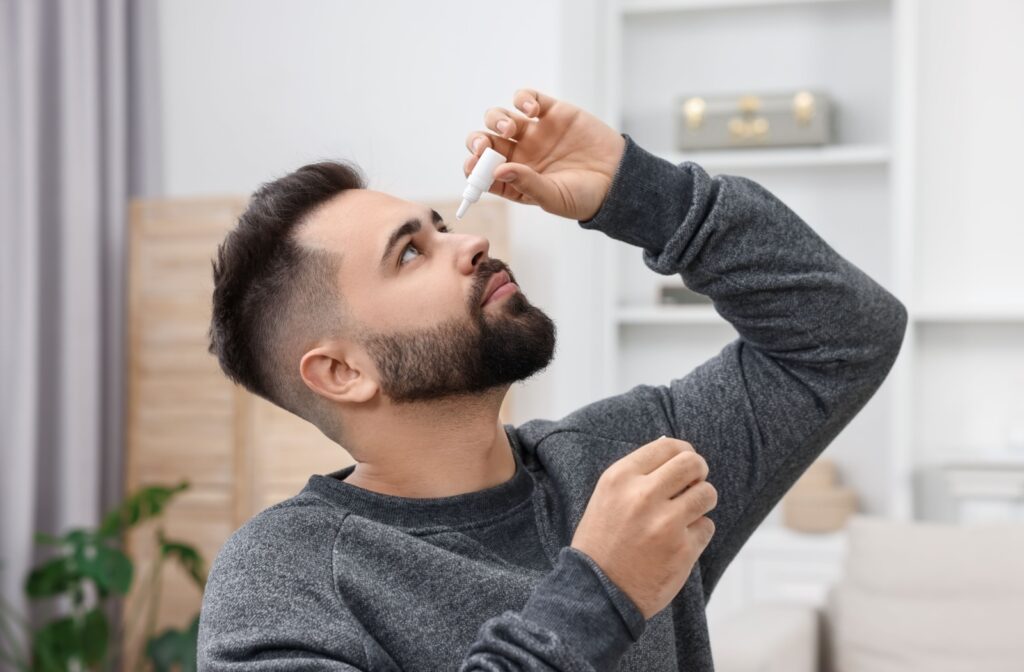Dry or irritated eyes are usually blamed on screen time or aging. But growing research shows that gut health can influence inflammation throughout the body, including in the eyes. This means that an imbalanced gut may affect tear production and make dry eye symptoms worse.
At InVision Eyecare Centre, we want to support your overall health. Understanding how the gut and eyes are connected can open the door to lasting relief and more effective treatment.
What Is the Gut-Eye Connection?
The gut and eyes may appear worlds apart, but they’re connected through the body’s intricate microbiome system. The microbiome consists of trillions of microorganisms in your body, mostly located in your gut. These microorganisms play a role in digestion, immune function, and even inflammation control.
When your gut microbiome becomes imbalanced due to poor diet, stress, or antibiotics, systemic inflammation may follow. This inflammation can extend to other parts of your body, including your eyes, potentially worsening or triggering dry eye symptoms.
Understanding Dry Eyes
Dry eye is a common condition where your eyes don’t produce enough tears or the right kind of tears to stay properly lubricated. Symptoms can range from burning sensations to redness, blurry vision, and light sensitivity.
While most people link dry eyes to external factors like screen time or allergies, internal factors like inflammation from poor gut health might also be exacerbating the issue.
How Gut Health Impacts Eye Health
Chronic Inflammation
An imbalanced gut microbiome often leads to chronic low-grade inflammation. This inflammation can slow tear production and worsen meibomian gland dysfunction (a key contributor to dry eyes).
Immune System Regulation
Your gut plays an important role in regulating your immune response. A healthy gut minimizes inappropriate immune reactions, which might otherwise lead to eye inflammation and dryness.
Vitamin & Nutrient Absorption
Nutrients important for eye health, such as omega-3 fatty acids and vitamins A and D, depend on proper gut function for absorption. Gut imbalances might prevent your body from making the most of these nutrients.
Benefits of Holistic Approaches to Dry Eye Management
Addressing gut health offers more than just relief for your eyes. A well-balanced microbiome can support overall well-being, boosting digestion, energy levels, and immune function.
Patients who focus on their diet, hydration, and stress management often report fewer flare ups and more stable tear production. This supports the idea that lifestyle adjustments can play an important role in reducing symptoms over time.
Steps to Improve Gut Health & Treat Dry Eyes

Small lifestyle changes can make a big difference in both gut health and eye comfort. Here’s how you can get started:
Improve Your Diet
A diet rich in nutrients benefits your gut and can improve dry eye symptoms. Consider adding the following to your meals:
- Probiotic-rich foods: Yogurt, kefir, and fermented vegetables replenish good bacteria in your gut.
- Prebiotic fibers: Foods like asparagus, bananas, and garlic feed these good bacteria.
- Omega-3 fatty acids: Found in fatty fish like salmon and flaxseeds, omega-3s can minimize dry eye symptoms.
Stay Hydrated
Water is important for maintaining healthy tear production and preventing inflammation in the body. Dehydration can lead to reduced tear volume and increased eye dryness.
Staying well hydrated helps your body flush out toxins, supports digestion, and helps your eyes stay properly lubricated. If you struggle to drink enough water, try keeping a water bottle nearby or try infusing your water with fruit to add flavour.
Cut Back on Refined Sugars
Refined sugars can upset the balance of your gut microbiome by feeding harmful bacteria and reducing beneficial ones. This imbalance may trigger inflammation that affects the entire body, including your eyes. Inflammation can interfere with tear production and worsen dry eye symptoms.
Limiting sugary drinks, processed snacks, and desserts can help restore gut health and reduce irritation. Choose naturally sweet foods like fruits, which also provide fiber and nutrients that support both gut and eye wellness.
Manage Stress
Chronic stress can negatively affect your gut, leading to imbalanced bacteria and inflammation. Incorporate stress-relieving activities like yoga, mindfulness, or even a relaxing walk into your routine.
Work With Your Eye Doctor
At InVision Eye Care Centre, we view eye health holistically. While you adopt healthy gut habits, our dry eye treatments can provide symptom relief as you address the root cause. Services like tear evaluations or meibomian gland treatment can be part of your custom care plan.
Book Your Appointment
If you’re struggling with dry eyes and believe your gut health could be playing a role, we’re here to help. At InVision Eye Care Centre, we combine eye care solutions with a deeper understanding of whole-body health.
Take the first step today. Book your appointment or contact us to learn more about our dry eye treatments and integrative care.



